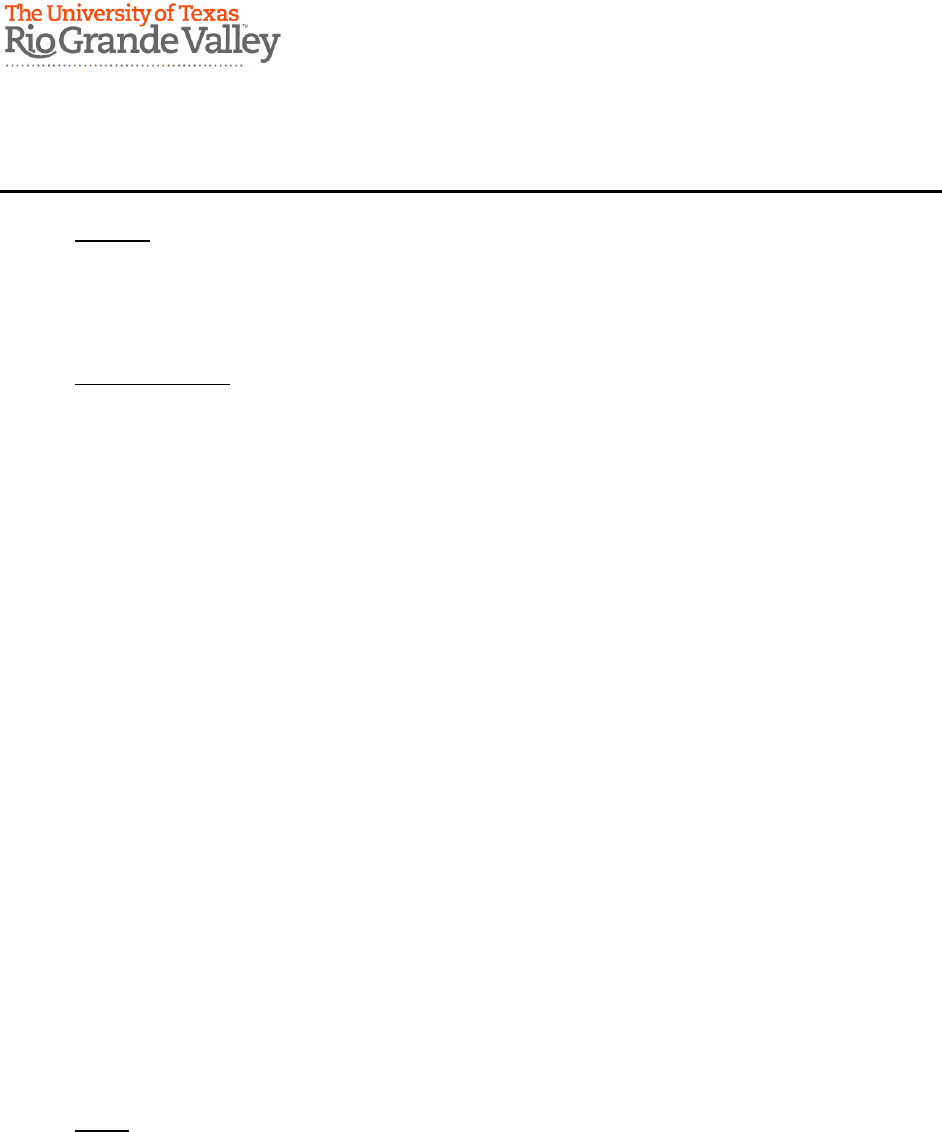
Handbook of Operating Procedures
Policy Number: ADM 07-105
Responsible Executive: Research, Graduate Studies,
and New Program Development
Originated: 09/15/2020
1
EXPORT CONTROLS
A. Purpose
The purpose of this policy is to facilitate and maintain an open, fundamental research
environment at The University of Texas Rio Grande Valley (UTRGV) that complies with federal
export control laws and regulations.
B. Persons Affected
This policy applies to all employees, faculty, trainees, students, volunteers, contractors, or other
affiliated individuals who engage in activities in which UTRGV resources are used, including
without limitation the following activities:
1. Travel outside the United States (U.S.);
2. Teaching and research collaborations with foreign nationals or foreign entities, inside or
outside the U.S. (research, field work, or course instruction);
3. Hiring of foreign nationals;
4. Shipping or taking information, items, hardware, or software outside the US;
5. Conducting research in controlled areas (e.g., non-public software/source code, encryption
technology, nuclear technology, chemical/biological weapons, military technology, etc.);
6. Visit/admission of foreign students or foreign visiting scholars through any UTRGV facility;
7. Negotiation of sponsored program/research agreements;
8. International financial transactions or financial support;
9. Transfer of technology; or
10. The acquisition/disposition of export-controlled information, technologies, items or
proprietary information.
C. Policy
1. UTRGV is committed to the exchange of research and technology in full compliance with U.S.
export controls laws and regulations, including obtaining any required export licenses for the
transfer of export controlled materials, data, technology, or equipment to a foreign national,
entity, or government either in the U.S or abroad. UTRGV will conduct its teaching, research
and service activities in compliance with U.S. export controls laws and regulations, including
without limitation those promulgated by the Department of Commerce, through its Export
Administration Regulations (“EAR”), the Department of State, through its International Traffic

Handbook of Operating Procedures
Policy Number: ADM 07-105
Responsible Executive: Research, Graduate Studies,
and New Program Development
Originated: 09/15/2020
2
in Arms Regulations (“ITAR”), and the Department of Treasury, through the Office of Foreign
Assets Control (“OFAC”).
2. The President will appoint or approve the appointment of an Empowered Official (EO) and
Export Controls Officer (ECO), who will be responsible for UTRGV’s compliance with U.S.
export controls laws and regulations. The EO and ECO are expected to work with appropriate
vice president(s), deans, department heads, and directors, the Institutional Compliance
Officer, the Office of Research Compliance and the Chief Legal Officer (or designee) to create
and maintain a campus-wide export control program and related procedures, standards, or
manuals. The program will document and disseminate information on roles, responsibilities,
and procedures for identification, approval, licensing, and tracking of items or activities
subject to export controls laws. The program will also include record‐keeping, awareness
training, and procedures for self‐assessment and monitoring. The EO and ECO are also
responsible for determining whether a project is export controlled, to provide advice and
assistance on the matter.
a. The EO has authority and power to: i) represent UTRGV before the export control
regulators in matters related to registration, licensing, commodity jurisdiction requests
or voluntary disclosures; ii) sign paperwork and bind UTRGV in any proceeding before
DDTC, BIS, OFAC or government agency with export controls responsibilities; iii) sign
export license applications or other requests for approval on UTRGV’s behalf; and iv)
independently inquire into any aspect of a proposed export and verify the legality of the
transaction and accuracy of the information to be submitted.
b. The ECO has the authority and responsibility for implementing the campus-wide export
control program and any related procedures, standards, or manuals.
3. Fulfilling UTRGV’s commitment to compliance with U.S. export controls laws and regulations
requires individuals, departments, and administrative units to cooperate and timely comply
with this policy and any procedures, standards, or manuals implementing this policy and
UTRGV’s export control program. Individuals, departments, and administrative units must be
aware of export controls implications of their work and must ensure their activities conform
to export controls rules and regulations. Any required license or approval must be obtained
before exporting anything deemed controlled. The EO and ECO will provide educational
materials or training to employees, departments, and administrative units whose
responsibilities may be affected by U.S. export controls laws and regulations.
4. UTRGV expects instruction, research, and services at UTRGV or using University Resources to
be conducted in an open manner, without restrictions on publication and dissemination of
results of academic and research activity, in order to maximize campus activities exempt from
export license requirements under the Fundamental Research Exclusion, Educational
Information and Published Information Exceptions.
5. Failure to comply with the requirements of this policy or any procedures, standards, or
manuals implementing this policy could result in the individual being subject to remedial or
disciplinary action, up to and including termination or non-renewal, and could also subject
the individual to civil penalties or criminal prosecution.
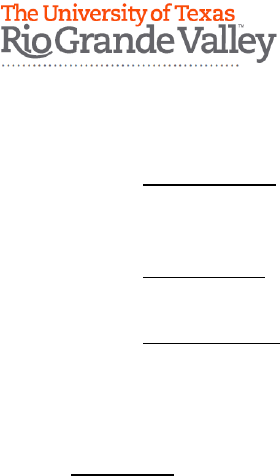
Handbook of Operating Procedures
Policy Number: ADM 07-105
Responsible Executive: Research, Graduate Studies,
and New Program Development
Originated: 09/15/2020
3
a. ITAR penalties: Civil – up to $1,094,010 each violation, extra compliance measures,
debarment, and loss of export privileges; criminal – up to $1,000,000 each violation and
10 years imprisonment.
b. EAR penalties: Civil – up to $284,582 per violation or twice the amount of the transaction
and loss of export privileges; criminal – up to $1,000,000 and 20 years imprisonment.
c. OFAC penalties: Civil - up to $284,582 per violation; criminal – refer to appropriate law
enforcement agencies for criminal investigation or prosecution, with actions that could
include could include license denial/revocation or the subject person could be ordered to
cease and desist.
D. Procedures
1. Because of the constant changes in export control laws and regulations, individuals subject to
this policy are encouraged to contact the EO or ECO to ensure that they are conducting UTRGV
business in accordance with these laws and regulations.
2. The export of certain information, items, technologies, software and hardware is regulated
and controlled by federal law for reasons of national security, foreign policy, prevention of
the spread of weapons of mass destruction and for competitive trade reasons. University
research traditionally has been excluded from these regulations through the Fundamental
Research Exclusion and Educational Information and Published Information Exceptions.
However, university research involving controlled technologies, or transactions and
exchanges with designated countries, individuals and entities, may require UTRGV to obtain
prior approval from the appropriate federal agency before allowing non-U.S. persons to
participate in controlled research, collaborate with a foreign company or share research—
verbally or in writing—with foreign entities or persons who are not U.S. citizens or permanent
residents. To assist the EO and ECO in the implementation of a campus-wide export control
program, the following individuals, offices will have the responsibilities identified below, as
well as any additional responsibilities designated by the EO or ECO:
a. The Office of Sponsored Programs (OSP) shall be responsible for reviewing the terms of
the award program for provisions that restrict access to or publication of research and
technical data, that limit the participation of foreign nationals in the research effort, or
that otherwise render the exclusion from the export controls regulations inapplicable.
OSP shall also be responsible for screening parties participating in sponsored/service
projects against restricted parties’ lists.
b. The Department of Research Compliance and Export Controls shall be responsible for the
implementation of this Policy, the development and management of related export
controls procedures, provide training, and the development and implementation of an
export controls compliance program.
c. The Office of International Admissions and Student Services and the Office of
International Programs and Partnerships shall be responsible for screening all
international visiting scholars, participant students, and international collaboration
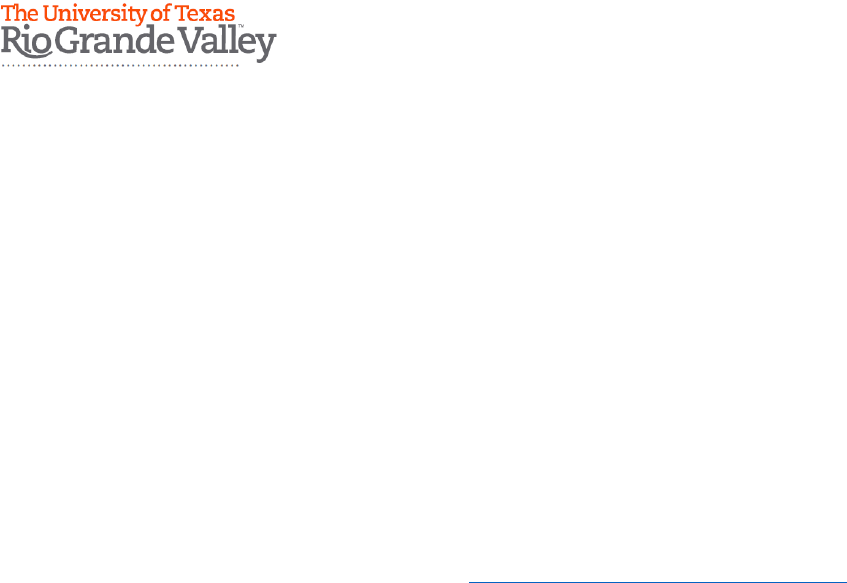
Handbook of Operating Procedures
Policy Number: ADM 07-105
Responsible Executive: Research, Graduate Studies,
and New Program Development
Originated: 09/15/2020
4
agreements against restricted parties’ lists and assuring that participants meet export
controls regulations regarding sanctioned and embargoed countries.
d. The Procurement/Purchasing Office shall be responsible for screening all vendors against
restricted parties’ lists and complying with export controls related to embargoed and
sanctioned countries.
e. The Office of Technology Commercialization shall be responsible for identifying
intellectual property owned by UTRGV subject to export controls and for assuring
compliance with required laws and regulations in the transfer/license of intellectual
property.
f. The Office of Human Resources shall be responsible for requesting the “Deemed Export
Attestations” for foreign nationals to be hired by UTRGV. Foreign nationals may work
with certain controlled items, dependent upon the specific work to be conducted and
required restrictions.
g. The Travel Office, along with the International Oversight Committee (IOC), shall be
responsible for screening and approving international travel of UTRGV employees.
Traveling to certain sanctioned countries could require a license from OFAC. OFAC
prohibits transactions and the exchange of goods and services with certain countries and
with designated persons and entities.
h. The Office of Information Security shall be responsible for instructing international
travelers on export controls regulations, including restrictions/license requirements that
may apply to items proposed to be taken on a trip outside of the U.S.
i. Executives, Deans, Chairs, Department Heads, and Directors will be responsible for
oversight and monitoring of export-controlled items – identified under the Export
Administration Regulations (EAR) and International Traffic Arms Regulations (ITAR) -
awards, and other classified information within their respective areas (e.g., equipment,
software, lab materials, technology or technical data). This includes, but is not limited to,
a responsibility for the:
i. Protection of controlled items and other classified information;
ii. Identification of controlled items and other classified information; and
iii. Shipment of controlled items and other classified information.
j. Principal Investigators (PIs) must ensure that their activities conform to export controls
rules and regulations and that they do not disclose controlled information or transfer
controlled articles or services to a foreign national without prior authorization as
required.
k. UTRGV managers (academic deans, directors, department heads) have the responsibility
for overseeing export controls compliance in their respective schools, departments,
centers or institutes and supporting the ECO in implementing procedures as deemed
necessary by the ECO for export controls compliance. In addition, the directors of other
offices or units on campus have responsibility for overseeing export controls compliance

Handbook of Operating Procedures
Policy Number: ADM 07-105
Responsible Executive: Research, Graduate Studies,
and New Program Development
Originated: 09/15/2020
5
in their units and supporting the ECO in implementing procedures, as deemed necessary
for export controls compliance.
E. Definitions
1. Deemed Export – The release or disclosure (visual or oral) of controlled information, items,
technology, hardware or software to a foreign national inside the United States. Situations
that can involve a “deemed export” include tours of laboratories; participation of foreign
nationals in certain research, development, and manufacturing activities; foreign students or
scholars conducting research; and hosting of a foreign scientist, among others. Such release
is a “deemed” export to the country of the foreign national. Any release of controlled
technology or source code, subject to the Export Administration Regulations (“EAR”), to a
foreign person in the United States is “deemed” an export to the person’s country or countries
of nationality. This deemed export rule does not apply to persons lawfully admitted for
permanent residence in the United States and does not apply to persons who are protected
individuals under the Immigration and Naturalization Act. Refer to section 734.2(b) of the
EAR. A “deemed” export situation can occur by access/use in research or training, visual
inspection or an oral exchange of information.
2. EAR (Export Administration Regulations) – Regulations that control dual use items found in
the Commerce Control List (CCL) that have been designed for commercial purposes but also
have military applications, e.g., computers, pathogens, civilian aircraft. The regulations also
cover goods, test equipment, materials, software, and technology that could adversely affect
national security if exported.
3. Educational Information – Information that is released by instruction in catalog courses and
associated teaching laboratories of academic institutions. Educational Information is not
subject to Export Controls.
4. Empowered Official (EO) – An empowered official is a U.S. citizen who is legally empowered
in writing by the President of UTRGV to sign export license applications or other requests for
approval on behalf of UTRGV. The EO must understand the provisions and requirements of
the various export controls statutes and regulations, and the criminal liability, civil liability and
administrative penalties for violating these statutes and regulations. The EO has the
independent authority to inquire into any aspect of a proposed export, verify the legality of
the transaction and the accuracy of the information to be submitted, and refuse to sign a
license application or other request for approval without prejudice or other adverse recourse.
5. Export – Transfer of controlled technology, information, equipment, hardware, software or
services to a foreign person or entity in the U.S. or abroad by any means.
6. Export Controls Laws & Regulations – The group of federal laws and regulations that prohibit
or restrict the export and re-export of certain commodities for reasons of national security or
protections of trade. The group includes, but it is not limited to, Arms Export Controls Act,
International Traffic in Regulations (ITAR), the Export Administration Regulations (EAR),
Economic and Trade Sanctions administered by the Office of Foreign Asset Controls (OFAC),
Foreign Trade Regulations (FTR), Nuclear and Regulatory Commission Control (NRCC), and
Foreign Atomic Energy Activities, among others.
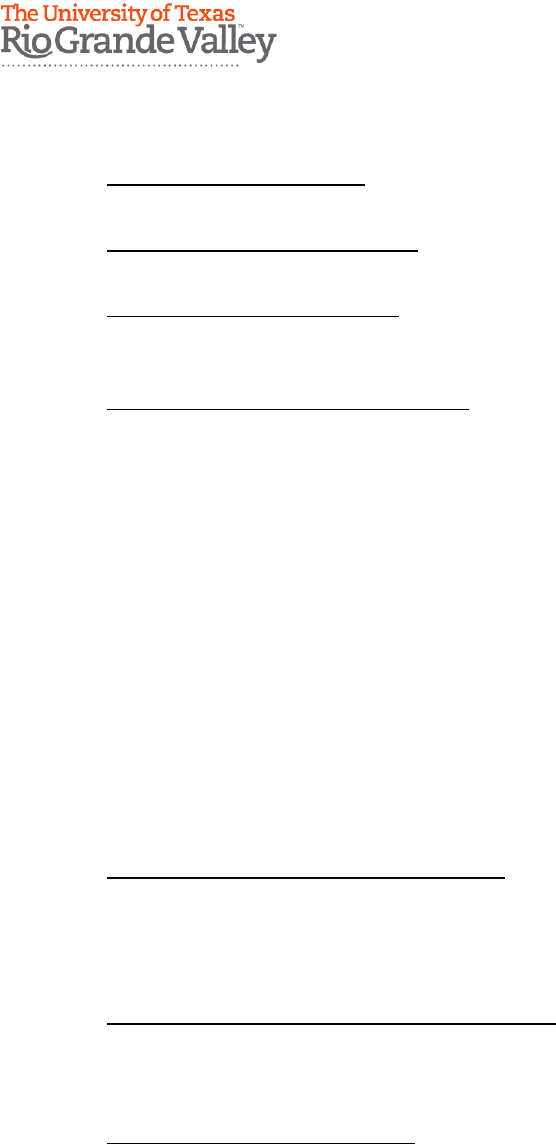
Handbook of Operating Procedures
Policy Number: ADM 07-105
Responsible Executive: Research, Graduate Studies,
and New Program Development
Originated: 09/15/2020
6
7. Export Controls Officer (ECO) – Means a person appointed by the President to have ultimate
responsibility for institutional compliance with export controls regulations.
8. Foreign entity/foreign government – An entity or government of, or relating to, a country or
jurisdiction other than the U.S.
9. Foreign person/Foreign national – A person other than a U.S. Citizen, Permanent Resident
Alien, or a “protected individual” under 8 USC 1324b(a)(3). Protected individuals include
political refugees and political asylum holders.
10. Fundamental Research Exclusion (FRE) – The export controls regulations exempt from
licensing requirements technical information (but not controlled items) resulting from
"fundamental research." Fundamental research is defined as research in science, engineering
or mathematics conducted at an accredited U.S. institution of higher education where the
resulting information is ordinarily published and shared broadly within the scientific
community. The Fundamental Research Exclusion (FRE) permits UTRGV to allow foreign
members of its communities (e.g., students, faculty, and visitors) to participate in research
projects involving export-controlled technical information on campus in the U.S. without a
deemed export license. Further, technical information resulting from fundamental research
may be shared with foreign colleagues abroad and shipped out of the United States without
securing a license. The FRE only applies to information that “arises during or results from” the
research. If there is, preexisting export-controlled technology required to conduct the
research then deemed export-licensing implications must be considered. University research
will not be considered fundamental research if: (i) UTRGV or its researchers accept restrictions
on publication of scientific and technical information resulting from the project or activity, or
(ii) The research is funded by the U.S. Government and specific access and dissemination
controls protecting information resulting from the research are applicable.
11. ITAR (International Traffic Arms Regulations) – Regulations that control the export of military
items found on the U.S. Munitions List (USML), e.g., munitions, defense articles, most space
related technologies (because of their application to missile technology), and technical data
related to defense articles and services, including design and use of defense articles. ITAR
also denies exports of these items to certain countries.
12. Office of Foreign Asset Control (OFAC) Sanctions – A department of the U.S. Treasury that
enforces economic and trade sanctions against countries and groups of individuals involved
in terrorism, narcotics and other disreputable activities enforced by the Office of Foreign
Asset Control of the U.S. Department of the Treasury.
13. “Published” Information Exception - Information is "published" (and therefore not subject to
export controls) when it becomes generally accessible to the interested public in any form,
including: publication in periodicals, books, print, electronic, or other media available for
general distribution; readily available at libraries open to the public or at university libraries;
patents and published patent applications available at any patent office; and release at an
open conference, meeting, seminar, trade show, or other open gathering held in the U.S.
(ITAR) or anywhere (EAR).
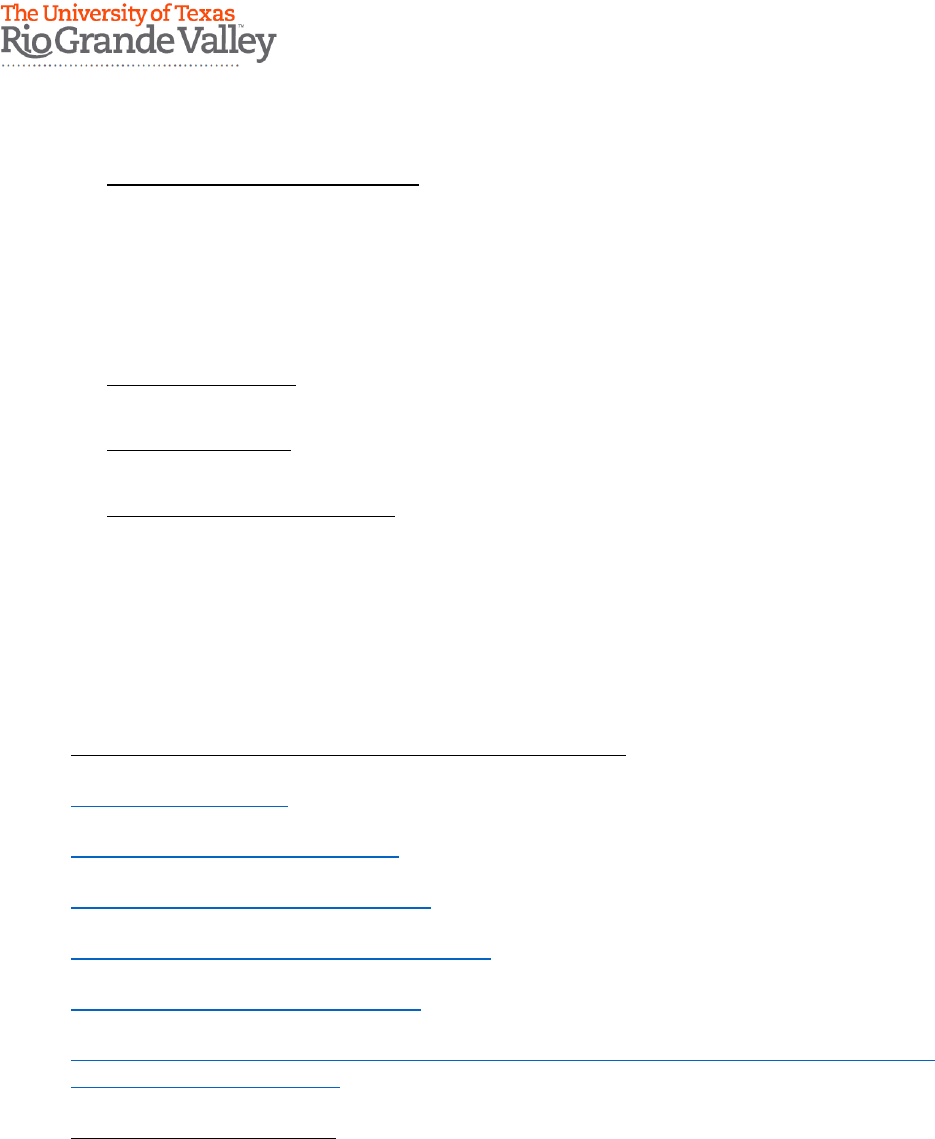
Handbook of Operating Procedures
Policy Number: ADM 07-105
Responsible Executive: Research, Graduate Studies,
and New Program Development
Originated: 09/15/2020
7
14. “Technology” or “Technical Data” - These phrases refer to technical information beyond
general and basic marketing materials about a controlled commodity. They do not refer to
the controlled equipment/commodity itself, or to the type of information contained in
publicly available user manuals. Rather, the terms "technology" and "technical data" mean
specific information necessary for the development, production, or use of a commodity, and
usually take the form of blueprints, drawings, photographs, plans, diagrams, models,
formulae, tables, engineering specifications, and documentation.
15. University Employees – Mean all UTRGV employees, full-time and part-time; including student
employees, consultants, visitors, and others using UTRGV’s resources.
16. University Resources – Means all resources owned or leased by UTRGV, or otherwise utilized
by UTRGV personnel within the scope of UTRGV activities.
17. “Use” of Controlled Equipment – The routine "use" of controlled equipment by foreign
nationals (e.g., using it in the ordinary way specified in the user manual, in such a manner that
does not disclose technical information about the equipment beyond what is publicly
available) does not require a license. However, a license may be required if a foreign national
is "using" the equipment in such a way as to access technical information beyond what is
publicly available (e.g., accessing the source code of software or modifying a piece of
equipment in such a way as to gain non-publicly available technical information about its
design) even if the Fundamental Research Exclusion is applicable.
F. Related Statutes or Regulations, Rules, Policies, or Standards
UTS 173 Export Controls
Bureau of Industry and Security (BIS)
Export Administration Regulations (EAR)
International Traffic in Arms Regulations (ITAR)
Office of Foreign Assets Control (OFAC)
Department of Defense (DoD) Policy on Contracted Fundamental Research/ National Security
Decision Directive (NSDD) 189
G. Dates Reviewed or Amended
Not applicable.
